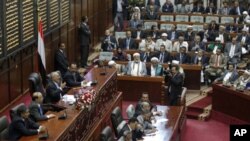Yemeni President Ali Abdullah Saleh has announced a series of concessions, including suspending his campaign for constitutional changes that would allow him to remain president for life and pledging that his son would not seek to be his successor.
Mr. Saleh, who has ruled for 32 years, declared Wednesday "no extension, no inheritance, no resetting the clock." He was referring to ruling party proposals on term limits seen as designed to enable him to run for office again.
The longtime leader, who is an important U.S. ally against al-Qaida, told Yemen's parliament he will not try to extend his presidency when his current term runs out in 2013. Mr. Saleh spoke to a legislative session boycotted by the opposition, a group dominated by Islamists.
Yemen's SABA news agency says U.S. President Barack Obama called his Yemeni counterpart Wednesday to express support for the initiative.
Mr. Saleh's announcement comes a day before Thursday's planned opposition protest - dubbed a "day of rage" - that continues a string of rallies activists have said were inspired by demonstrations in Tunisia and Egypt.
In his address Wednesday, Mr. Saleh called for a halt to all planned demonstrations.
The Yemeni opposition, which has promised to hold protests every Thursday for the next month, has not demanded Mr. Saleh's ouster thus far, but rather reforms and a smooth transition of power through elections. They welcomed his announcement but said Thursday's rally will still go ahead.
Last week, at least 10,000 demonstrators gathered at Sana'a University and about 6,000 elsewhere in the capital for rallies against the government.
Yemen, at risk of becoming a failed state, is trying to fight a resurgent al-Qaida wing, quell a southern separatist movement and cement peace for Shi'ite rebels in the north - all in the face of crushing poverty.
Mr. Saleh has proposed raising salaries for civil workers and the military in the wake of the protests. He has also ordered income taxes cut in half and has instructed his government to install price controls.
Some information for this report was provided by AP and Reuters.




